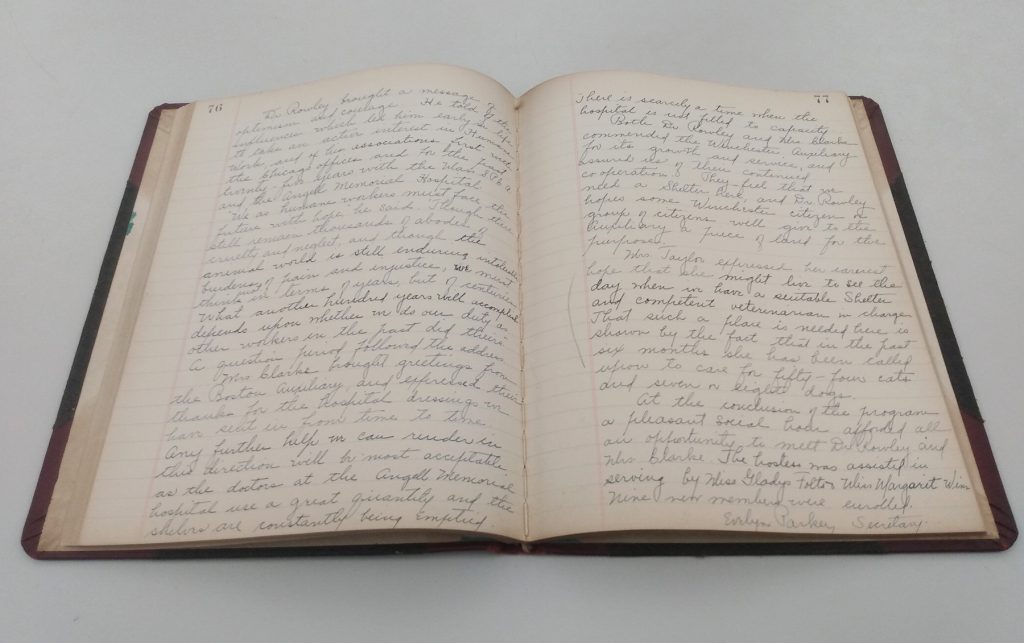By Susan Martin, Senior Processing Archivist
The Massachusetts Society for the Prevention of Cruelty to Animals (MSPCA) was founded in March 1868 by George Thorndike Angell. (You might recognize his name from the Angell Animal Medical Center.) That same year, he and his prominent backer Emily (Warren) Appleton were instrumental in getting the first anti-animal cruelty law passed in Massachusetts.
The MHS holds a number of printed items related to the MSPCA, but today I’d like to focus on a small manuscript volume we acquired a few years ago: the records of the Winchester (Mass.) Women’s Auxiliary of the MSPCA. What’s interesting about this volume is how we can see the mission of the state organization applied to local issues.

The Winchester Auxiliary was founded in 1931, and these records document its first seven-plus years. The organization’s work consisted of fundraising via fairs, food sales, and other events; support for animal facilities and services; education on the humane treatment of animals, including Be Kind to Animals Week every spring; and lobbying for animal-friendly legislation.
Most meetings were held at the home of Marion Munroe (Rice) Taylor, the group’s founder and president, at 137 Mount Vernon Street. Her sister Carolyn B. Rice served on the Work Committee. Sometimes there were guest speakers, among them Edith Washburn Clarke and Francis H. Rowley, and members routinely spent time during meetings preparing surgical dressings for veterinary hospitals.
Local concerns addressed by the group included: the lack of an animal clinic or qualified veterinarian in town, conditions at the dog pound, and the summer watering of horses. One member successfully appealed to Eugenia Parker, scion of the wealthy Parker family of Winchester, to allow drivers to water their horses on her property at 60 Lloyd Street during the hot summer months.
Speaking of horses, the auxiliary also participated in the annual MSPCA Horses’ Christmas. Every holiday season, the MSPCA collected and distributed free food to working horses in Boston. One year, Winchester residents donated “fifteen and a half bushels of grain, about four bushels of carrots, several pounds of loaf sugar and many bags, large and small, of apples.” As the secretary wrote, “although the number of horses in the State is now so much smaller than before the days of the automobile, the records show that of the cases of cruelty handled by the Society in the past three months, 50% were for cruelty to horses.”
The organization also advocated for legislation that ran the gamut, from laws against steel traps, animal experimentation, and exploitative and abusive roadside zoos and pet shows, to the protection of coastal waterfowl from pollution by oil-burning ships. In particular, the auxiliary fought for a ban on “setting up” horses’ tails, a practice which, as expert Sandra Tozzini explains, included removing or cutting bones, muscles, or tendons for purely cosmetic purposes.
I was impressed with the initiative and the ingenuity of these women and the variety of their activities. Wherever they saw a need, they took action. At the end of one meeting, the chairperson quoted from Matthew 25:40: “Inasmuch as ye have done it unto the least of these, ye have done it unto me.”
As word got out, membership in and donations to the group increased. Marion Taylor became the go-to person for complaints about animal abuse or neglect in Winchester. She offered advice, referred matters to the authorities, and even took animals into her home. In one ten-month period, she “personally cared for 78 cats, 4 pigeons, 5 baby squirrels, 2 baby owls, and 9 dogs.”
Mrs. Taylor wasn’t the only person celebrated by the Women’s Auxiliary. Also recognized were “the brave Winchester girl, Miss Dorothy Goodhue, who jumped into the icy water of the Aberjona River to save her dog,” as well as “the lineman who, while working recently in Winthrop, rescued two tiny puppies from an ashcan where they had been abandoned.”

